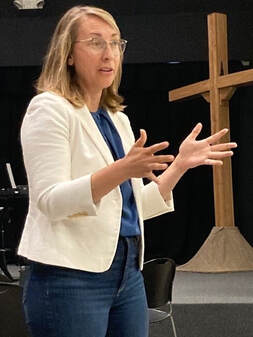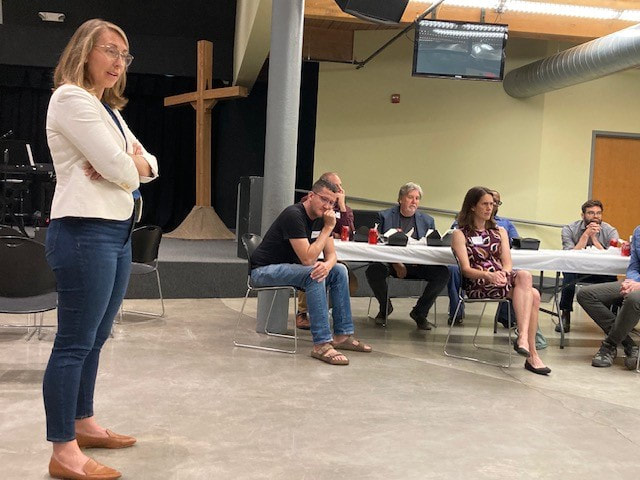|
The Grand Rapids Association of Pastors met on Friday, June 9 at City Life Church -- our first ever Friday meeting. It was a pleasure to get back to our pre-COVID habit of eating lunch together. Rev. Jack Kooreman reminded those gathered of how G-RAP started in 2015 after the events in Ferguson, MO with a diverse group of pastors who met together to address issues of justice and unity in the Grand Rapids community. We often talk about denominational and racial diversity, but this meeting also demonstrated the occupational diversity of ordained people. There were senior pastors, chaplains, counselors; leaders in non-profit organizations addressing homelessness, environmental issues, and families in crisis; a clinical ethicist for a hospital system; and the manager of diversity and inclusion for a major corporation. Farewell Father Brocato Before moving to the official business of the day, we said farewell to Father Christian Brocato, Rector at St. Mark's Episcopal Church. He has come faithfully to almost every G-RAP meeting, hosted lunch meetings, and showed up to pray whenever we put out the call. He is moving to Philadelphia and we wish him much joy as he lives close to his family again. Family Promise Tenisa Frye, the brand new CEO of Family Promise of West Michigan, told us about the vital role congregations play in their work of helping families get free from the cycles of poverty and homelessness. Local churches can act as a host congregation or a support congregation. Host congregations dedicate some of their building space to give a family emergency shelter for a week. Family Promise provides the furnishings, but the congregation supplies meals. Support congregations come alongside the hosts to assist with meals. The family will rotate through the host churches until permanent housing is available. Frye said they started with 12 churches in 1997; now they have 40. There are a number of other ways they help families with housing, including partnering with Mel Trotter, giving families a title to a mobile home, and acting as the lessor and subleasing to a family. In addition, they work to give families the financial planning, career preparation, and mental health tools they need to prevent them from returning to homelessness. Congresswoman Hilary Scholten The main event of this meeting was to hear from Congresswoman Hilary Scholten. Scholten previously spoke with G-RAP in November 2018 when she was an attorney with the Michigan Immigrant Rights Center (MIRC): Busting Myths and Leaning into Local Issues About Immigration. This time, she described what propelled her to the U.S. House of Representatives. "If you would've told me I'd be the first woman in history to represent West Michigan, I wouldn't have believed you. Growing up in somewhat conservative West Michigan, I didn't know a Democrat until I was a senior in high school." She described her parents as being "deeply service oriented." Her mother was a public school teacher and her father a local sports reporter who made his job more about seeing people and telling their stories than about reciting scores. Scholten took that service orientation and became a social worker and then an attorney at the U.S. Department of Justice. After 2016, when her work at the Department of Justice meant having to participate in family separations at the southern border, and the Muslim travel ban, she left: "I made an oath to protect and defend the Constitution, so I left the job I wanted more than anything else." Her family moved back to Grand Rapids and she worked at the MIRC with immigrants who were impacted by the policies that prompted her leave Washington D.C. Scholten persevered after her loss in her first run for Congress and won in 2022. She said, "In hindsight it's easy to see the path God was calling me to, but at the time, it was tough." She went to Washington hoping to be a leader who can put partisanship aside. Within six months, she's been able to introduce a bipartisan immigration bill sponsored by three Republican women and three Democratic women: "It isn't perfect, but we showed that we can agree, even in an environment with such division." Question and Answer Time In response to a question about the lane she sees for common-sense environmental policy, she detailed her determination to get a committee assignment that would allow her serve the environmental needs of her district, which runs from Grand Rapids along the Grand River to Muskegon and Grand Haven. She was one of 5 freshmen selected for the Transportation and Infrastructure Committee (out of 50 who applied), where she serves on the Water Subcommittee. Here, she's hoping to work on alternative energy, while "gently and enthusiastically learning to push back" against colleagues when they go "too far." One of the pastors asked Scholten to address the issue of a southern border wall. She began by noting that she's been working on immigration from a variety of angles since college, including enforcement, and she says she knows there are border security issues. To people who say there aren't, she responds, "Twenty-four thousand human trafficking victims a year disagree." But she notes that, "A wall sounds wonderful and is an immediate response, but it is not the best or most effective way to address the problems." She told us that no material they could build the wall with lasts more than ten years, so by the time they finish building where they physically can, the earliest sections are degrading and crumbling and they have to begin all over again. She'd rather harness people power and technology, the latter via drone support. When asked what she didn't know when she started in Congress that she wish she had, she said, "Always keep snacks in your bag because there's no time for lunch!" The best advice she received was from a mentor who also had children: "The kids are going to be alright." Speaking of the kids, young people are what give her hope -- young people who worked on her campaign, high school groups she meets with. She is proud of what her office has been able to get done, especially returning over $7 million back to her constituents via tax benefits and retirement credits. They hold Funding Fridays calls every week to talk about grant opportunities for people in her district. She says, "Even if there's gridlock in Congress, we're doing good work in the district, with caseworkers out there all the time." We were grateful that Congresswoman Scholten took time out of her schedule to talk with us. As we always do with our guests, we closed the meeting by praying for her, her family, and her work. We typically take July and August off from regular meetings, but change may be afoot. If you are a pastor in the Grand Rapids area who is passionate about justice issues and you do not receive emails from us, please send a message to [email protected] and we will make sure you get on the list.
7 Comments
|
AuthorNatalie Hart Archives
September 2023
|


 RSS Feed
RSS Feed